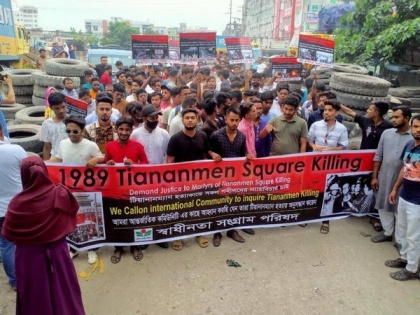Human chain protests in Bangladesh on Tiananmen Square massacre anniversary
By ANI | Published: June 5, 2022 01:38 PM2022-06-05T13:38:58+5:302022-06-05T14:00:07+5:30
Marking the 33rd anniversary of the Tiananmen Square massacre, Swadhinata Sangram Parishad on Saturday organized a protest in Dhaka against China for killing its own citizens.

Human chain protests in Bangladesh on Tiananmen Square massacre anniversary
Marking the 33rd anniversary of the Tiananmen Square massacre, Swadhinata Sangram Parishad on Saturday orgzed a protest in Dhaka against China for killing its own citizens.
The protest, which started at 5 pm at Jatrabari near Dhaka Chattogram Highway and continued till 6:30 pm, was attended by 500 people. The protest highlighted China's inhuman activity that took place on June 4, 1989, to the international community.
Various socio-cultural orgzations had also staged the demonstrations in Dhaka as well as Narayanganj city in Bangladesh. The protesting orgzations condemned and demanded justice for the genocide carried out by the Chinese communist government on pro-democracy students in their country.
On behalf of civil society-conscious civil society, speakers said that on June 4, 1969, in Tiananmen Square, China, when the country's democracy and peace-loving people protested against the Chinese government's repression, the Chinese army carried out indiscriminate genocide against civilians.
Moreover, Muktijoddha Mancha held a demonstration and human chain program in front of the National Museum in Shahbag, Bangladesh on Saturday. During the demonstrations, about 400 people were present.
The program started at 3 in the afternoon and continued till 6:30 in the evening. About a thousand visitors were aware of the program and condemned China's actions.
Notably, the Tiananmen Massacre took place after the peaceful gatherings of students, workers, and others in Beijing's Tiananmen Square and other Chinese cities in April 1989, calling for freedom of expression, accountability, and an end to corruption. The government responded to the intensifying protests in late May 1989 by declaring martial law.
On June 3 and 4, the People's Liberation Army (PLA) soldiers fired upon and killed untold numbers of peaceful protesters and bystanders. In Beijing, some citizens attacked army convoys and burned vehicles in response to the military's violence.
In that massacre, 10 to 15 thousand people were killed by the army of the Chinese government.
Following the killings, the government carried out a nationwide crackdown and arrested thousands of people on "counter-revolution" and other criminal charges, including arson and disrupting social order.
The government has never accepted responsibility for the massacre or held any officials legally accountable for the killings.
Chinese authorities, over the last year, have increased the harassment and persecution of activists for commemorating June 4, 1989, Tiananmen Massacre, Human Rights Watch (HRW) said. The Chinese government should acknowledge and take responsibility for the mass killing of pro-democracy demonstrators, it added.
A few months ago, Hong Kong's universities removed the Tiananmen memorials. In December 2021, the University of Hong Kong removed "Pillar of Shame," a large sculpture commemorating the massacre victims, from the university premises.
( With inputs from ANI )
Disclaimer: This post has been auto-published from an agency feed without any modifications to the text and has not been reviewed by an editor
Open in app